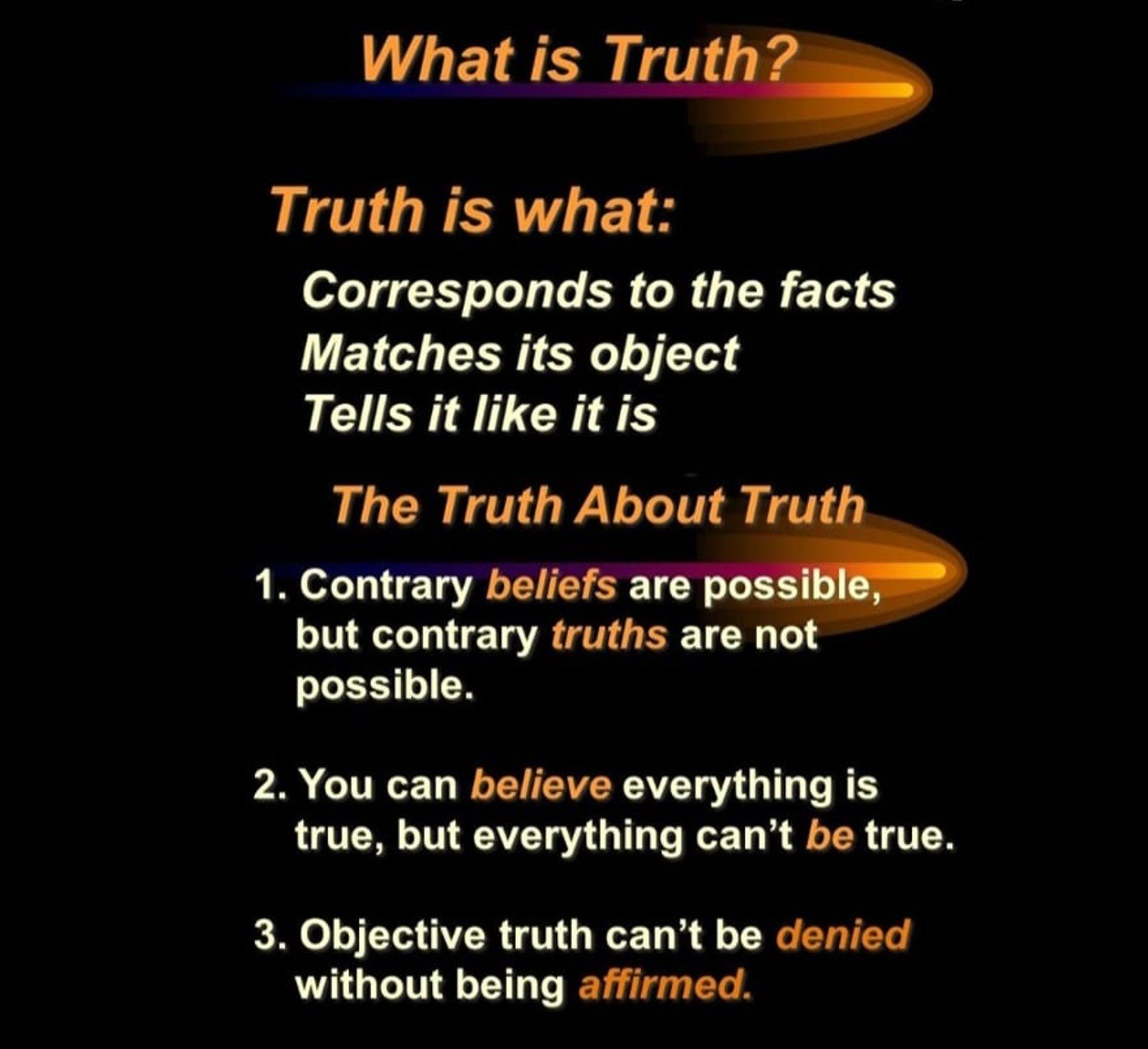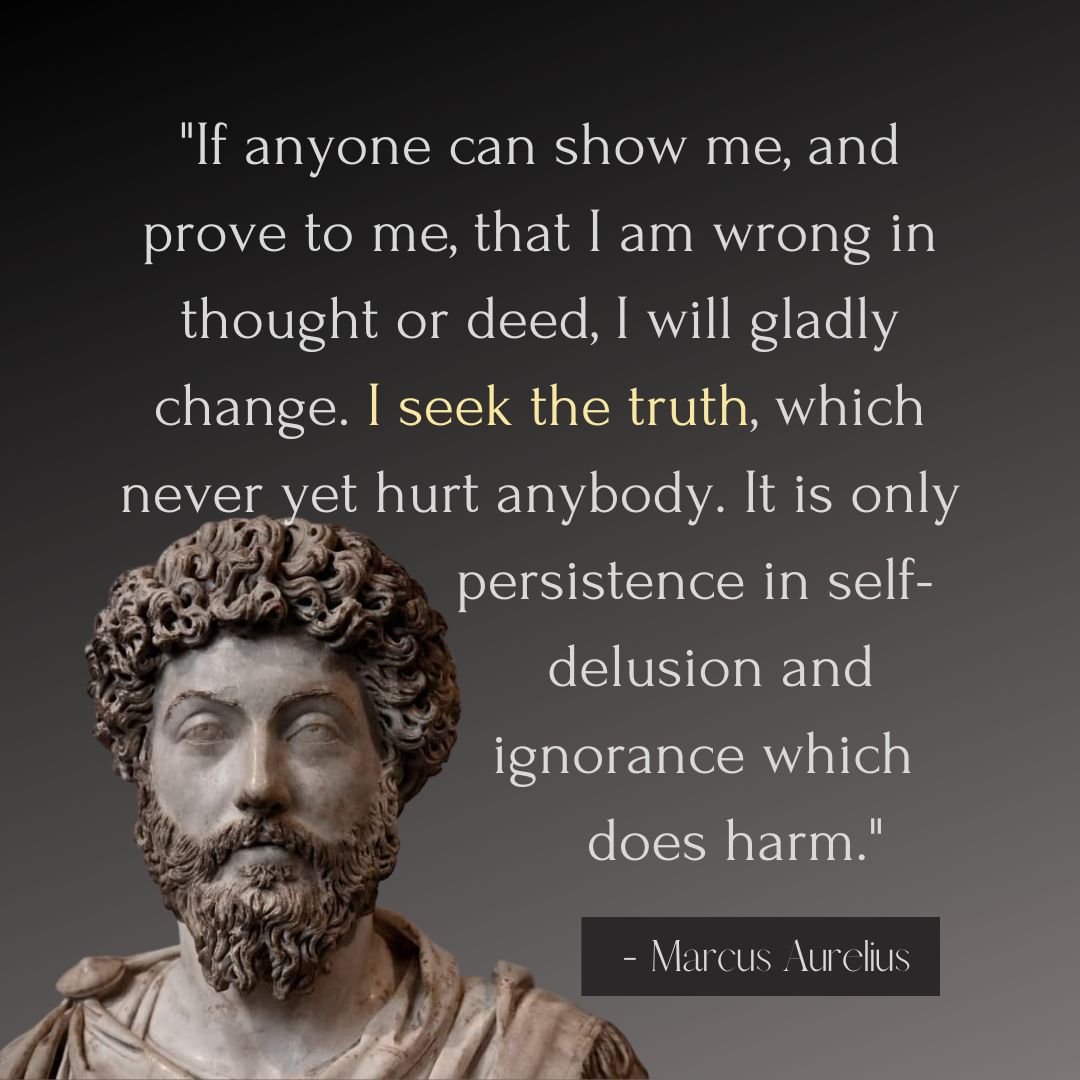The Lost Truth of Truth
In our current woke world, it is tantamount to blasphemy to dare suggest there are only two kinds of truth. It’s become quite popular to believe in relativism, that truth is relative and not absolute. However, it’s the lack of understanding that there are two types of truth that is at the root of most of the confusion.
One type of truth is internally based and is our personal opinion of things. This is called subjective truth. The other truth is externally based and reflects the way the world actually is. This is called objective truth. Few people seem to be conscious of the difference between the two, which can make discussing truth a difficult task.
But knowing the difference between reality-based truth and our personal subjective “truths” is essential for our safety, happiness and well being. The way we perceive and recognize truth deeply impacts every part of our lives. And we cannot address life’s biggest questions without a solid foundation of just what exactly is and is not truth. Because real, dependable, objective truth is the very foundation of reality itself.
Subjective Truth (internal)
When I say chocolate chip cookies with walnuts are the best cookies ever, that statement is a true statement. At least it is for me. It’s my personal taste opinion about cookies. Naturally, you may think I’m wrong, because to you snickerdoodle cookies may be the best. In either case, we are simply subjects having an opinion about something in the world. But our opinions about which homemade cookie is best tells us (or anyone else) nothing about the reality and nature of the cookies themselves. Our subjective truth about cookies only describes something about us, nothing about the cookies. Subjective truths always relate to and are based on the subject.
Unfortunately, in our current culture, too many people see all truth in the same way as their cookie preferences. A popular saying right now is, “That may be true for you, but not for me.” (Which is really just another variation on subjective truth called relative truth.) And that is a perfectly valid (true) statement when it comes to our favorite cookies, but too often these days it’s applied to everything else as well. Subjective truth has quickly become the truth of feelings and slogans, where the only truth is whatever you currently like, feels good or is culturally popular.
Objective Truth (external)
Saying men cannot get pregnant is an objective truth statement. It’s called objective because it’s making a truth claim about a reality outside our minds and thoughts. Objective truths are externally based. They are not opinions that can be changed the way we change our shirt. They are features of the real world. When I claim that men cannot get pregnant, I am pointing out a fact of reality that men do not have the physical apparatus needed to develop an embryo and give live birth to a human baby. This is not a personal subjective opinion, but a statement about an objective, self-evident, demonstrable, physical fact. My opinion about it is irrelevant. So is yours. The way we determine if a statement is true is to look at the objects themselves and see if the statement matches the reality. “Shoulds” or “ought tos,” are irrelevant, we only care about the actual is-ness. If the statement matches reality, then it is a true statement.
Here’s an example: You don’t need to believe in gravity in order for it to be a true aspect of reality. It’s an objective truth that doesn’t care about your feelings, opinions, shoulds or desires. Blithely deny gravity and run off a cliff and you will quickly be introduced to another objective reality called hard ground. Gravity, like hard ground, is an external reality unaffected by human will, opinion, beliefs or ideologies. All objective truths are the same. Deny or ignore them at your peril.
Six Facts About Objective Truth
Objective truth exists whether you know about it or not (ie; germs existed before they were discovered)
Objective truth transcends cultures (ie; gravity is true for everyone regardless of religion, ethnicity, culture or beliefs)
Objective truth is unchanging - even though our beliefs about it may be wrong or change (ie; the earth always revolved around the sun even when it was widely held that the sun revolved around the earth)
Beliefs or feelings do not change facts (objective truth), no matter how strongly we may believe them (ie; the earth is still round regardless of flat-earthers beliefs)
All objective truths are absolute truths (ie; Law of Non-contradiction: if something is true, it’s opposite must therefore be false)
Feelings are not a reliable indicator of objective truth, only subjective truth
The Correspondence View Of Truth
This understanding of objective truth is called the “correspondence view” of truth. And the working definition of it goes like this: If my belief (and opinions/perceptions) about the world matches the way the world actually is in reality, my belief about the world is true. This perception of truth has been understood since the first human had the thought that sabretooth tigers might be dangerous and then watched his friend get eaten by one.
We are literally wired to know basic truth. We automatically evaluate the world every day of our lives using this definition of truth. We look both ways crossing the street because we know that, like a sabretooth tiger, a two ton vehicle will always come out the winner in any encounter. We are wired to be truth-seeking beings. Our Creator made us that way.
We NEED to know what is true if we want to be successful, happy and have meaningful lives. A stockbroker needs to know the reality (the objective truth) of a company’s financial condition to know whether it’s a good buy or not. Not knowing the truth could lead to a massive loss. The company’s CEO opinion may or may not have anything to do with the actual truth. Thus it is vital that we never accept what other people, governments or authorities tell us is true unless it corresponds to reality. Because men still can’t get pregnant, no matter if the whole world is insisting that it does and condemns you for being a “bigoted, religious conservative.”
Truth remains truth even when it’s out of popularity.
Aligning with The Truth
Truth is a basic building block of reality - we really can’t escape it. Anyone who says, “There is no truth!” is in that moment making a truth claim. They are declaring that “there is no truth” is a true statement. It’s sad/funny how often I have heard this self-defeating statement.
Successfully navigating the real world requires that we recognize that there are real objective truths whether we happen to like them or not. Thus instead of ignoring them or deceiving ourselves, we should be aligning our beliefs with the way the world really is, instead of trying to insist reality conform to our beliefs. Many essential features of the world are objective and unchangeable, such as the laws of mathematics, laws of logic, physics, morality, etc. We didn’t create them; we discovered them. Our acknowledging and aligning with them helps to keep us safe. Knowing what is true means properly aligning our self with reality. If we believe something about the world that is not true we are deluded. And false beliefs lead us to live and act in opposition to the way the world actually works.
A Post-Truth Culture
Truth, it seems, has been discarded by the wayside by our modern culture. It’s too inconvenient and uncomfortable. Young people have gleefully tossed objective truth in the garbage bin and lit it on fire. The Oxford Dictionary Word of the Year in 2016 was “post-truth.” Mainstream media un-ironically reports that we live in a post-truth culture (one wonders if they considered if that were true why we would believe their report?). The rejection of objective truth really rears its head when the subject of moral truth comes up. Dare to posit that there are objective truths such as men can’t be women on any modern campus and you’ll quickly be mobbed and shouted down by self-righteous angry students.
But answering life’s most important questions depends on us finding the truth. The real truth, not our wishful beliefs. Which leads us to seek to know the ultimate objective truth, which is the existence of God, His nature and our relationship with Him. Does God exist? If so, is he the Christian God, or some other religion’s God? Are all religions just false beliefs? Or is one true? If so, which one is true and how can we figure out which one? Or is it that, as is commonly (and falsely) touted, “all roads lead to God?”
I became a Christian despite a lifetime of being anti-Christian because after finally doing my own research, I came to the astonishing conclusion that Truth lies at the heart of the Christian worldview. And I came to that conclusion not solely because of what I read in the bible, but also from the monumentally overwhelming scientific and philosophical evidence supporting it.
We don’t need more false beliefs. Especially not about God. We need to know the truth, the kind that corresponds to reality.
The Truth of Christianity
Everyone has a worldview, their way or perspective of viewing the nature of reality and their place in it. But how many have actually self-examined their worldview to see if it actually corresponds to the big picture of life? I certainly didn’t, not until reading the bible launched me on a journey of reexamining every deeply held belief I had unconsciously adopted from a mostly unexamined life.
Whichever worldview you believe should reflect the way the world actually is. This is why I believe in Christianity and am no longer an atheist. The materialistic worldview of atheisim is filled with self-defeating logic and cannot answer the most basic of meaningful questions, such as why are we here, do we have a purpose, where did we come from, where are we going? I didn’t become a Christian because it “works for me.” I didn’t suffer a terrible tragedy or find something lacking in my life. And I certainly didn’t become a Christian because it makes my life easier - it doesn’t. I actually had zero interest in becoming a Christian. I have just always been hungry to know the truth. And since I didn’t have an ax to grind or a position or beliefs to defend, I was open to examining the evidence and seeing where it might lead me.
All that Christianity offers (beside the most important part of being redeemed from our sin by the sacrifice Jesus made for us on the cross!) is the most reasonable explanation for the origin and nature of the universe. It’s the only religion or worldview that not only explains the existence of evil, but offers the solution to it. Christianity is the only worldview that answers the questions of where we came from, where are we going, why we are here, the reason for evil, the source of morality, the origin of the universe, the origin of life in general, why if men evolved from animals we have a moral conscience and duties, the nature of consciousness, and much, much more.
With just a little research, one can quickly begin to see that the basic tenants of Christianity correspond to reality. Unlike other religions or secular worldviews it’s the only one that makes sense of the world we inhabit. Which is a really big claim. So don’t take my word for it. Do your own research. Cling to what you can verify is true, but be willing to challenge your sacred cows. Seek to know the truth, the whole truth, and nothing but the truth.
It’s worth it.
“And you will know the truth and the truth will set you free.” (John 8:3
(I remember reading about this when I was first considering Christianity. Then in less than two years I discovered my entire worldview completely flipped on its head, experiencing for myself the astonishing renewal of my mind in the light of God's truth. Hallelujah! I'm so grateful!)






